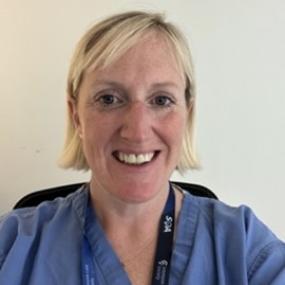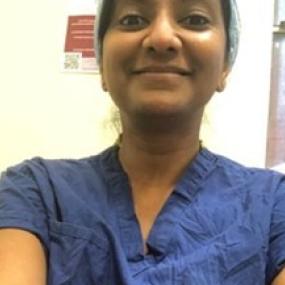Its Swell-being in SWICM

Jeanie is a Dual ICM and Anaesthetic trainee in the Severn Deanery. She has two daughters, a springer spaniel and enjoys playing the bassoon in local orchestras and chamber groups. She holds the golden tracheostomy award for the longest duration of training in SWICM.

Inthu has recently completed her training in Dual ICM and Anaesthetics in the Severn Deanery and is currently working as an ECMO fellow in St Thomas’s hospital, London. Outside of work she’s a keen runner, gardener and traveller.
The background low level internal monologue that is common to many trainees is a familiar sound track; ‘The ICM trainee internal podcast’:
‘You can’t have it all, ‘How do I juggle my work life balance?’, ‘I’m a bad parent, mother, father, trainee’ ‘I’m not spending enough time at work vs I’m not spending enough time with my children/partner/family/friends’ ‘Will I get a consultant job?’, ‘Am I good enough?’ ‘imposter syndrome, imposter syndrome, imposter syndrome’
This hum, or white noise as one fellow trainee described it to me, is sometimes only realised once the training has ended and the holy grail of consultant post has been achieved. Whilst I’m not naive enough to think that being a consultant is the land of milk and honey, where all my troubles will be instantly forgotten, I do think that the certainty, security and lack of constant assessment that post CCT brings, will feel like a massive relief.
Female trainees and consultants in ICM are in the minority when compared to the proportion of female medical students graduating from university. Why does it matter that ICM is not representative of medical school graduates? The short answer is, we don’t know. What we do know is that with diversity brings diverse ideas, problem solving, a rich and dynamic workforce. Obviously, diversity is not just about gender, but this is where we begin.
Throughout my long and circuitous training journey since graduation in 2005, I’ve noticed that female trainees form the majority when it comes to working less than full time (LTFT), taking more time out of training (TOOT), potentially taking on more of the childcare responsibilities and enduring many curriculum and e-portfolio changes. I fall into most of those categories, and whilst the experiences have enriched my life in many ways, from a career point of view, the challenges that these changes bring, have far exceeded the advantages. These in part contribute to the reasons that have discouraged or prevented female trainees from entering or taking on consultant ICM roles. What is the perception of the future workforce? We surveyed a group of ACCS trainees in the Severn deanery, 70% were female; the most common reason not to choose a career in ICM was a perceived lack of work life balance.
My parents have reluctantly kept all of my old school and university documents for years, finally requesting that I remove said items, gathering dust and taking up precious space in their attic. I found an old school book that I wrote aged 6, clearly documenting that I wanted to be a doctor and climb Mount Everest. Last week, my daughter’s reception class were asked what they wanted to be when they grow up (she wants to be a pilot). Doctor was still a front runner, amongst fairy princess, footballer, snowplough driver and trampoline instructor to name but a few. My daughter then asked me if I liked my job? Yes, emphatically yes! My inner 6-year-old self is happy and content (note to self, must book flights to Kathmandu asap). But how do we support each other through the difficult times when the doubts creep in? Being in the minority as a female trainee is not necessarily a bad thing, but I do think that we need role models to give us an idea of what career we are aspiring to and we need kindred spirits to cajole and guide us there.
This segues nicely onto the heart of the matter; how can we support, mentor and improve the well-being of female trainees so that they complete their training, become consultants, future leaders and role models of the future? Inthu, a friend and fellow trainee and myself mulled over this problem, as we were emerging from the post-apocalyptic covid world last year.
Inspired by the group WICM, we set up Severn Women in Intensive care Medicine (SWICM) aiming to be a complementary group to WICM, with the primary aim of improving wellbeing and support to female trainees. Our inaugural meeting was held in May 2022; wine tasting led by the multi-talented sommelier and newly appointed Intensive Care Consultant, Dr Rachel Jones.

Regular meetings have also included a pub quiz, cocktail evenings, country walks, discussions about how to get a consultant job and informal discussions with newly appointed female consultants. We have set up a mentoring program amongst trainees, championed a career in ICM at a foundation doctors career evening and tried to establish the barriers to recruiting female ICM Consultants following discussions with clinical leads at our local teaching hospitals. The trainees in the group gave us feedback after a year, about what they liked about SWICM:

Moving forward: We are in the process of setting up South West off shoots of the group to include Wales and Peninsula and hope to extend the groups further if successful.
What have we learnt in the process? Nothing ground breaking, nothing earth shattering. I worked as a GP for a short period of time and safe to say the job wasn’t for me. Why?
I don’t like sitting on my own in a room in front of a computer. I prefer having colleagues to bounce off and enjoy working as part of a large MDT; I suspect most Intensive Care trainees are the same. We need comradery and a collegiate atmosphere in which to thrive. We think and hope that in part SWICM has delivered this to the female Severn Intensive Care Medicine Consultants of the future.
Related Content
Written by Dr Laura Coleman
Written by Dr Alexandra Kendall-Smith
Written by Dr Emily Reynolds

